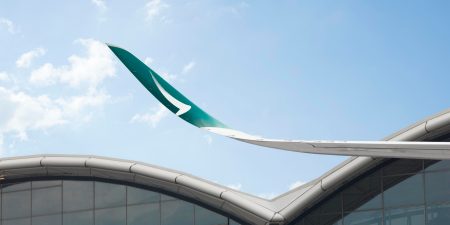
Cathay Pacific releases traffic figures for September 2023
Cathay Pacific carried a total of 1,542,144 passengers last month, an increase of 480.1% compared with September 2022. The month’s revenue passenger kilometres (RPKs) increased 316% year on year. Passenger load factor increased by 11.2 percentage points to 83.7%, while capacity, measured in available seat kilometres (ASKs), increased by 260.4% year on year. In the first nine months of 2023, the number of passengers carried increased by 1,099% against a 546.7% increase in capacity and a 736.8% increase in RPKs, as compared with the same period for 2022.
The airline carried 119,963 tonnes of cargo last month, an increase of 15.3% compared with September 2022. The month’s cargo revenue tonne kilometres (RFTKs) increased 16.9% year on year. The cargo load factor decreased by 5.3 percentage points to 61.1%, while capacity, measured in available cargo tonne kilometres (AFTKs), increased by 26.9% year on year. In the first nine months of 2023, the tonnage increased by 20.1% against a 77.7% increase in capacity and a 53.8% increase in RFTKs, as compared with the same period for 2022.
Travel
Chief Customer and Commercial Officer Lavinia Lau said: “As we exited the busy peak summer months for passenger travel, we saw increased student traffic in September ahead of the start of the new school year, in particular to the UK. To cater for the strong demand, we increased the frequency of our flights between Hong Kong and the UK in September, with our services from Hong Kong achieving load factors of 98%.
“In addition to student traffic, there was a notable increase in outbound passenger travel from Hong Kong during the last week of September coinciding with the Mid-Autumn Festival and National Day holidays. We also saw strong demand from the Greater Bay Area and the rest of the Chinese Mainland for travel both into Hong Kong and to destinations beyond around the holiday period.
“Meanwhile, demand to Hangzhou was elevated with the Asian Games, and Cathay Pacific was proud to carry a significant number of athletes, spectators and officials to attend this incredible sporting occasion. It has also been great to see more conferences and exhibitions taking place in Hong Kong, which stimulated demand in the premium cabins as we near the traditional business travel peak.
Cargo
“On the cargo side, September marked the start of the traditional peak period and demand strengthened across most of the network compared with the previous month. Capacity also grew as passenger services were added on some key cargo routes.
“E-commerce remained a bright spot, particularly on the Americas trade lanes. Our mail business continued to gain momentum, with several post offices around the world adopting our newly launched Cathay Mail solution to improve their customer experience.
Outlook
“Looking ahead at the coming months, on the travel side we will continue to increase capacity as much as is feasible to provide more choice and flexibility for our customers. Earlier this month, we resumed our Chicago passenger service, which received a very encouraging response from our customers. With the next holiday period not until Christmas, we will remain agile to capture demand, including connecting traffic via the Hong Kong hub.
“For cargo, loads are expected to build over the next two months reflecting the year-end demand, and we have been adding freighter capacity on our transpacific routes to cater for this. Our intermodal sea-air feeder services from Dongguan will continue to see growth in throughput, providing customers a cost-effective option to move freight from the Greater Bay Area to the Hong Kong hub and onto our global network.”
The Cathay Group on 11 October 2023 announced that shareholder approval had been granted to proceed with a proposed capital reduction which, when completed, will facilitate the Group to buy back 50% – HK$9.75 billion – of the preference shares held by the Hong Kong SAR Government before the end of this year, and the remaining 50% by the end of July 2024, subject to market conditions and the Group’s business operations at the relevant time. The Cathay Group is extremely grateful for the continued support that the Hong Kong SAR Government and its shareholders have provided during and after the pandemic.
The full September figures and glossary are on the following pages.
| CATHAY PACIFIC TRAFFIC | SEP 2023 | % Change VS SEP 2022 | Cumulative SEP 2023 | % Change YTD |
| RPK (000) |
|
|
|
|
| - Chinese Mainland | 335,458 | 346.8% | 2,414,198 | 631.2% |
| - North East Asia | 794,901 | 2,913.2% | 7,133,827 | 7,165.1% |
| - South East Asia | 705,565 | 640.7% | 6,681,563 | 1,720.8% |
| - South Asia, Middle East & Africa | 386,760 | 1,003.8% | 2,595,392 | 1,974.9% |
| - South West Pacific | 813,649 | 495.4% | 6,593,783 | 854.6% |
| - North America | 1,837,682 | 161.0% | 14,133,472 | 414.7% |
| - Europe | 1,692,958 | 234.6% | 13,385,752 | 579.7% |
| RPK Total (000) | 6,566,972 | 316.0% | 52,937,987 | 736.8% |
| Passengers carried | 1,542,144 | 480.1% | 12,887,848 | 1,098.9% |
| Cargo revenue tonne km (000) | 689,625 | 16.9% | 5,936,362 | 53.8% |
| Cargo carried (000kg) | 119,963 | 15.3% | 1,003,833 | 20.1% |
| Number of flights | 3,713 | 111.3% | 29,254 | 127.1% |
| CATHAY PACIFIC CAPACITY | SEP 2023 | % Change VS SEP 2022 | Cumulative SEP 2023 | % Change YTD |
| ASK (000) |
|
|
|
|
| - Chinese Mainland | 476,149 | 298.0% | 3,228,569 | 285.8% |
| - North East Asia | 1,054,997 | 1,137.3% | 8,696,601 | 2,529.8% |
| - South East Asia | 1,003,589 | 476.3% | 8,250,079 | 1,094.5% |
| - South Asia, Middle East & Africa | 483,908 | 619.1% | 3,169,592 | 1,092.0% |
| - South West Pacific | 917,546 | 418.4% | 7,828,693 | 603.9% |
| - North America | 2,035,044 | 104.8% | 15,108,021 | 293.8% |
| - Europe | 1,878,223 | 235.0% | 14,485,301 | 523.6% |
| ASK Total (000) | 7,849,457 | 260.4% | 60,766,856 | 546.7% |
| Passenger load factor | 83.7% | 11.2%pt | 87.1% | 19.8%pt |
| Available cargo tonne km (000) | 1,128,196 | 26.9% | 9,517,102 | 77.7% |
| Cargo load factor | 61.1% | -5.3%pt | 62.4% | -9.7%pt |
| ATK (000) | 1,875,800 | 70.9% | 15,309,173 | 144.7% |
Glossary
Terms:
Available seat kilometres (“ASK”)
Passenger seat capacity, measured in seats available for the carriage of passengers on each sector multiplied by the sector distance.
Available tonne kilometres (“ATK”)
Overall capacity measured in tonnes available for the carriage of passengers, excess baggage, cargo on each sector multiplied by the sector distance.
Available cargo tonne kilometres (“AFTK”)
Cargo capacity measured in tonnes available for the carriage of freight on each sector multiplied by the sector distance.
Revenue passenger kilometres (“RPK”)
Number of passengers carried on each sector multiplied by the sector distance.
Cargo revenue tonne kilometres (“RFTK”)
Amount of cargo, measured in tonnes, carried on each sector multiplied by the sector distance.
Ratio:
Revenue passenger kilometres/
Cargo revenue tonne kilometres
Passenger/Cargo load factor = ------------------------------------------------------------
Available seat kilometres/
Available cargo tonne kilometres










